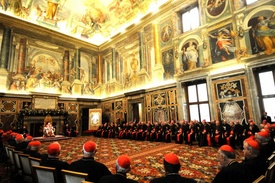‘Finish Your Life on the Cross’: Spiritual Motherhood in Saint Catherine of Siena’s Letters to Priests” by Sister Gabriella Yi, O.P was published in L’Osservatore Romano (August 12th-19th English edition). The author, Sister Gabriella Yi, O.P., is a member of the Congregation of St. Cecilia in Nashville, TN (also known as the Nashville Dominicans). A few times in the past I have posted some items on spiritual maternity and its necessity in the Church today, especially in the life of the priest.
At the foot of the cross, in the heart of the redemption, Our Lord Jesus Christ instituted a “new motherhood of Mary,” as he entrusted his mother to his beloved disciple and his beloved disciple to his mother. From this entrustment flows Our Lady’s spiritual motherhood of each member of Christ’s body, the Church, and especially her motherhood of his priests. Her maternal care for each priest was brought to our attention in a particular way by the Congregation for the Clergy’s teaching that, in union with Mary, all women are invited to live out their vocation to spiritual motherhood by offering their prayers and sacrifices for the salvation of souls and the holiness of Christ’s priests.
In his 1988 apostolic letter, Mulieris Dignitatem, Pope John Paul II speaks of motherhood and virginity as two important and related dimensions of a woman’s vocation. He describes how the vocation to motherhood is inscribed in the very being of a woman: she is not only physically but also psychologically endowed with the capacity to create a space within herself for another human being. John Paul speaks of this as a special “entrustment” that God has made to woman; she has the beautiful privilege of bringing forth new life into the world by the generous use of her feminine gifts.
Even those called to a life of consecrated virginity are not excluded from this vocation to motherhood. For them, John Paul says, there is the possibility of “a different kind of motherhood: a motherhood ‘according to the Spirit’. “In the life of consecrated women, this motherhood “can express itself as concern for people, especially the most needy….” John Paul is careful to point out that this concern for others on the part of consecrated women is motivated by spousal love for Christ. Just as natural motherhood is the fruit of the spousal love in marriage between husband and wife, spiritual motherhood is the fruit of the spousal love in religious life between the consecrated virgin and Christ.
What may come as a surprise to some is John Paul’s insistence that spiritual motherhood is not limited to unmarried women: “And does not physical motherhood also have to be a spiritual motherhood, in order to respond to the whole truth about the human being who is a unity of body and spirit?” John Paul II evidently sees it as an important dimension of every woman’s vocation.
The doctor of the Church who most clearly articulates this vocation to spiritual motherhood is the 14th century Dominican tertiary Saint Catherine of Siena, who is perhaps best known for the prayers, sacrifices, and counsel she offered Pope Gregory XI in his decision to return the papacy from Avignon to Rome. In looking to her as a model of spiritual motherhood for priests, we discover that Catherine teaches not only by the example of her prayers and sacrifices, but also by the counsel she offers in her letters: “See that in everything you turn to Mary as you embrace the cross,” “Make your home in the pulpit of the cross,” and “Finish your life on the cross,” encouraging her spiritual sons to identify themselves ever more closely with Christ the High Priest. Catherine’s spiritual motherhood, as seen in these letters, offers us a rich source of inspiration as we enter into this “Year for Priests.”
Catherine’s letters to priests often include words of encouragement in times of difficulty, as she writes to Blessed Raymond of Capua, referring to herself in the third person: “I’ve heard from a servant of God who constantly holds you before God in prayer, that you have been experiencing tremendous struggles and that your spirit has been overtaken by darkness because of the devil’s illusions and deceits.” With this image of holding a soul before God in prayer, as a mother holding her child out so that its Father might take it up into his arms, Catherine reveals the maternal quality of her prayer. With a mother’s intuition illumined by the Holy Spirit, she perceives the spiritual darkness he has fallen into and explains the enemy’s tactics: “He wants to make you see the crooked as straight and the straight as crooked, and he does this to make you stumble along the way so you won’t reach your goal.” In the face of such diabolical attempts to impede his priestly ministry, Catherine assures Raymond, “But take heart. God has provided and will continue to provide for you, and his providence will not fail you.” A priest’s confidence is to be placed, not in himself, where it is sure to fail, but in God’s providential care for him, especially in the form of his mother. As Our Lady’s maternal love for her son embraced him from the moment of his Incarnation to his death on the cross, so, too, does her maternal love embrace his priests in her constant intercession for them. Thus, they can entrust their priestly hearts wholly to hers, especially in times of discouragement, as Catherine advises, “See that in everything you turn to Mary as you embrace the cross.”
But it is not enough to embrace the cross-it must be mounted, as Catherine explains in her letter to Frate Bartolomeo Dominici: “After the fire of the Holy Spirit had descended on [the disciples], they mounted the pulpit of the blazing cross, where they felt and tasted the hunger of God’s Son, his love for humankind.” With this striking image, Catherine expresses the complete identification of Christ and his priests on the cross, blazing with the fire of divine charity, where they feel what he felt and taste what he tasted in his all-consuming love for us. Only from such a pulpit of divine charity do the words of priests wield supernatural power: “Then their words came forth as does a red-hot knife from a furnace, and with its heat they pierced their listeners to the heart and cast out the devils.” Indeed, many of Catherine’s own listeners were pierced to the heart, not only by her words, but also by those of the priests to whom she sent them in the pulpit of the confessional. Whether he is casting out devils in the confessional or at the altar, the pulpit of the cross is where the priest of Christ belongs, as Catherine implores, “So, my dearest son, I beg you-it is my will in Christ Jesus-make your home in the pulpit of the cross.”
From this pulpit, a priest of Jesus Christ engages in a battle for souls, beginning with his own, which is why in her letter to Frate Ranieri Catherine urges, “I long to see you a real knight, fighting against every vice and temptation for Christ crucified with a true holy perseverance.” With such chivalric imagery, she appeals to his masculine instincts for battle and adventure, as she continues, “For it is perseverance that is crowned. You know that victory is achieved by fighting and perseverance. In this life we are set as on a battlefield and we must fight courageously, not dodging the blows or retreating, but keeping our eyes on our captain, Christ crucified, who always persevered.” Just as no soldier goes into battle at his own initiative, but solely at that of his captain, so too must a priest take his commands from Christ, who:
. . . didn’t give up when the Jews said, ‘Come down from the cross!’ Nor did the devil or our ingratitude make him give up fulfilling the Father’s command and our salvation. No, he persevered right up to the end, when he returned to the eternal Father with the victory he had achieved, the victory of having rescued humankind from darkness and given us the light of grace once again by conquering the devil and the world with all its pleasures. And it killed him: this Lamb took death for himself in order to give us life; by his dying he destroyed our death.
Finally, as no soldier dies for an abstraction he holds, but for a beauty he loves, so too must Christ’s priests live and die for love of the beauty of his bride, the Church. Hence, Catherine concludes her letter to this priest simply with, “Finish your life on the cross.”
In these letters to Blessed Raymond of Capua and other priests, the voice of Saint Catherine of Siena as a spiritual mother is unmistakable. The authority with which she speaks is that of one whose spousal love for Christ united her so closely to him that his desire for the salvation of souls and the holiness of his priests has become her very own. As Catherine joins “that gentle mother Mary” in interceding for Christ’s priests, she invites us to do the same. In light of the Congregation for the Clergy’s document calling for spiritual mothers for priests and Pope Benedict XVI’s dedication of the current year as a “Year for Priests,” a rediscovery of this spiritual mother’s letters to priests could not be more timely.


